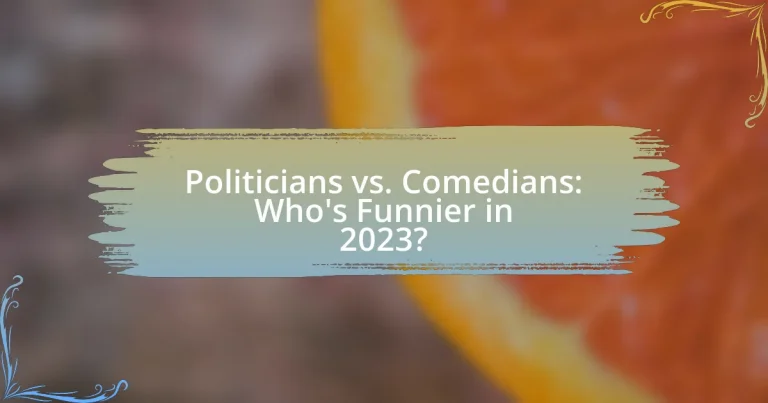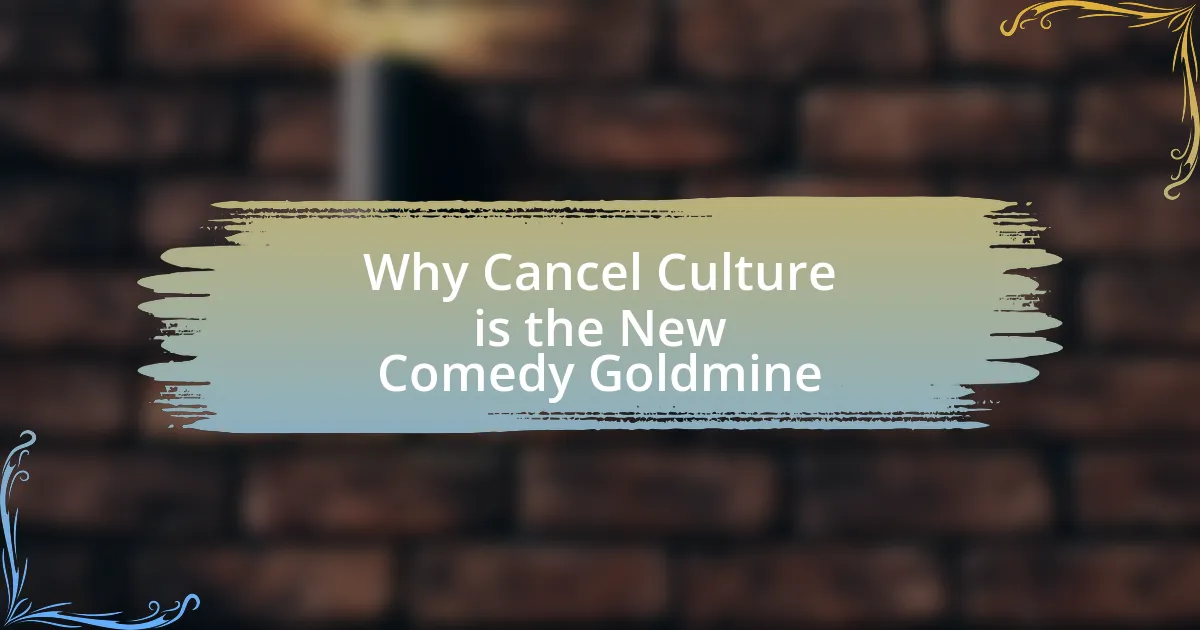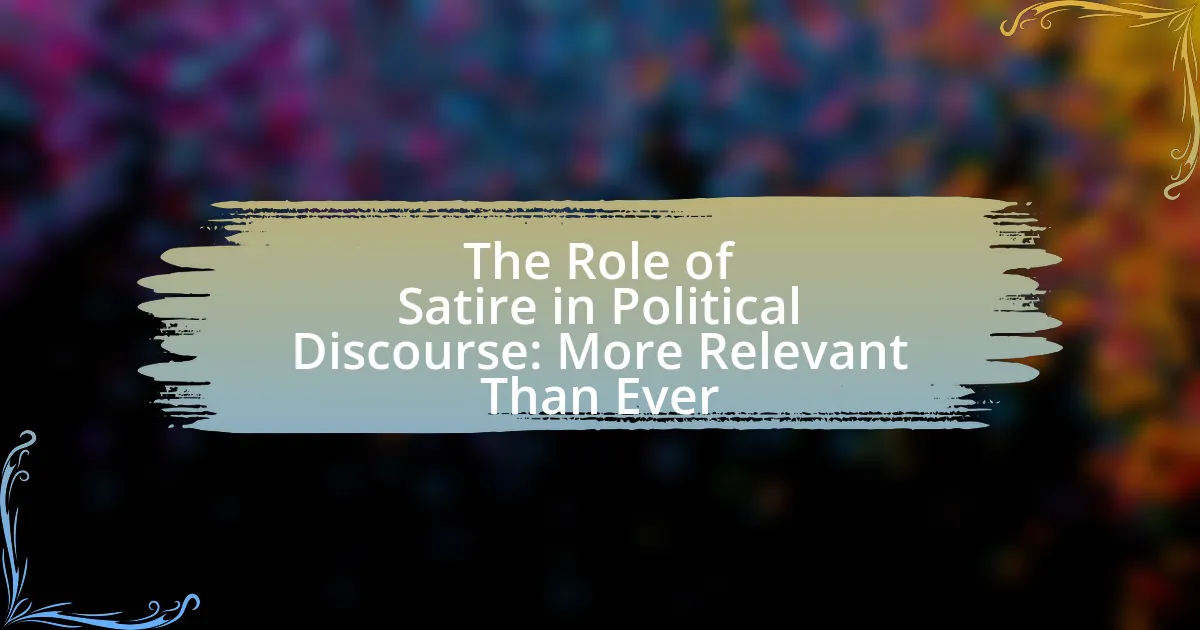The article examines the differences between politicians and comedians in 2023, focusing on their objectives, communication methods, and the role of humor in their respective fields. It highlights how politicians use humor strategically to connect with voters, while comedians prioritize entertainment and social commentary through satire and observational humor. The piece also explores the impact of political satire on public perception, the evolution of comedic styles influenced by historical events, and the challenges comedians face when addressing political issues. Ultimately, it concludes that comedians are perceived as funnier than politicians, supported by survey data and audience engagement metrics.
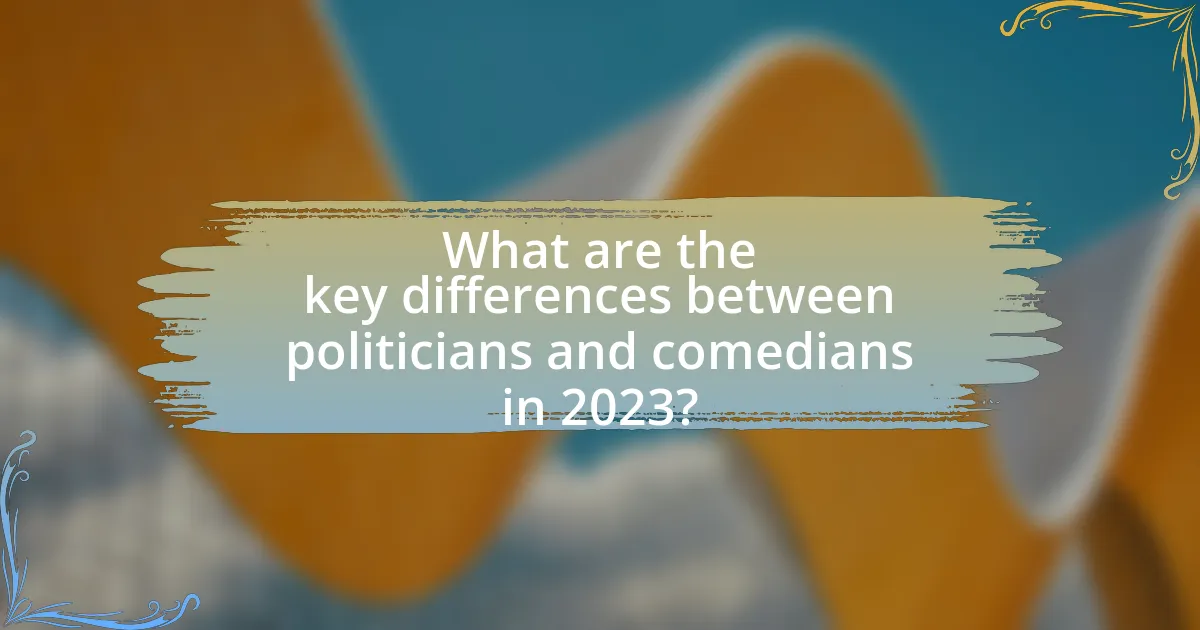
What are the key differences between politicians and comedians in 2023?
In 2023, the key differences between politicians and comedians lie in their primary objectives and methods of communication. Politicians aim to influence public policy and gain support for their agendas, often using formal language and structured arguments to convey their messages. In contrast, comedians focus on entertaining audiences through humor, employing satire, irony, and exaggeration to provoke laughter and critique societal norms.
For instance, politicians may deliver speeches that emphasize facts and statistics to persuade voters, while comedians often rely on observational humor and personal anecdotes to connect with their audience. This distinction is evident in the way both groups engage with current events; politicians may address issues with a serious tone, whereas comedians frequently use humor to highlight absurdities in political situations, as seen in late-night talk shows and stand-up routines.
How do their approaches to humor differ?
Politicians and comedians differ significantly in their approaches to humor. Politicians often utilize humor as a strategic tool to connect with voters, diffuse tension, or convey messages, frequently relying on relatable anecdotes or light-hearted jabs at opponents. In contrast, comedians prioritize entertainment and social commentary, employing satire, observational humor, and exaggeration to provoke thought and laughter, often critiquing societal norms or political issues. This distinction is evident in the way politicians may avoid controversial topics to maintain public favor, while comedians embrace them to challenge audiences and spark dialogue.
What techniques do comedians use to engage their audience?
Comedians use techniques such as observational humor, storytelling, and audience interaction to engage their audience. Observational humor involves highlighting everyday situations that resonate with the audience, making them relatable and funny. Storytelling allows comedians to build a narrative that captivates listeners, often incorporating personal experiences or cultural references that enhance connection. Audience interaction, including asking questions or responding to reactions, creates a dynamic atmosphere and fosters a sense of participation. These techniques are effective as they leverage shared experiences and emotions, making the comedic performance more impactful and memorable.
How do politicians utilize humor in their speeches?
Politicians utilize humor in their speeches to engage audiences, diffuse tension, and enhance relatability. By incorporating jokes, anecdotes, or light-hearted remarks, they create a more approachable image, making complex political issues easier to digest. For instance, during the 2020 presidential campaign, candidates like Joe Biden and Donald Trump used humor to connect with voters, often referencing current events or personal stories to elicit laughter and foster a sense of camaraderie. This strategy not only entertains but also helps to humanize politicians, making them seem more relatable and trustworthy to the electorate.
What role does satire play in political comedy?
Satire serves as a critical tool in political comedy by exposing and ridiculing the flaws and absurdities of political figures and systems. This form of humor encourages public discourse and reflection on political issues, often highlighting hypocrisy, corruption, and incompetence. For instance, shows like “Saturday Night Live” and “The Daily Show” utilize satire to comment on current events, shaping audience perceptions and fostering political awareness. Research indicates that satire can enhance political engagement, as viewers are more likely to discuss and reflect on issues presented humorously, thereby influencing public opinion and voter behavior.
How do comedians critique political figures through satire?
Comedians critique political figures through satire by using humor to highlight the absurdities and contradictions in their actions and statements. This method allows comedians to address serious political issues in an accessible way, often exaggerating traits or behaviors of politicians to provoke thought and discussion among audiences. For instance, shows like “Saturday Night Live” and “The Daily Show” have historically used impersonations and parody to comment on political events, effectively influencing public perception and sparking conversations about accountability and ethics in politics. Research indicates that satire can enhance political engagement, as it encourages viewers to think critically about political narratives and the motivations behind them.
What impact does political satire have on public perception?
Political satire significantly influences public perception by shaping opinions and attitudes toward political figures and issues. Research indicates that exposure to political satire can enhance political engagement and awareness, as it often simplifies complex political topics, making them more accessible. For instance, a study published in the journal “Political Communication” found that viewers of satirical programs like “The Daily Show” and “Saturday Night Live” demonstrated increased political knowledge and a greater likelihood of discussing political issues. This suggests that political satire not only entertains but also serves as a tool for political education, ultimately affecting how the public perceives politicians and their policies.
Why is humor important in politics and comedy?
Humor is important in politics and comedy because it serves as a tool for engagement and critique. In politics, humor can simplify complex issues, making them more accessible to the public, while also providing a means to challenge authority and highlight societal flaws. For instance, political satire has historically influenced public opinion, as seen in programs like “Saturday Night Live,” which has shaped perceptions of political figures through comedic sketches. In comedy, humor fosters connection and relatability, allowing audiences to process difficult topics in a lighter context. Research indicates that humor can enhance memory retention and understanding, making it an effective communication strategy in both fields.
How does humor influence voter behavior?
Humor significantly influences voter behavior by enhancing engagement and relatability to political messages. When politicians use humor, it can make their communication more appealing, leading to increased attention and retention of their messages. Research indicates that humorous content can lower resistance to persuasive messages, making voters more receptive to political ideas. For instance, a study published in the journal “Political Psychology” by researchers at the University of California found that humor in political advertisements increased viewer recall and positive attitudes toward candidates. This demonstrates that humor not only entertains but also serves as a strategic tool in shaping voter perceptions and decisions.
What psychological effects does humor have on audiences?
Humor has significant psychological effects on audiences, primarily by enhancing mood, reducing stress, and fostering social connections. Research indicates that laughter triggers the release of endorphins, which are natural mood lifters, and can lead to a decrease in cortisol levels, thereby alleviating stress. Additionally, humor promotes social bonding by creating shared experiences and facilitating communication, as evidenced by studies showing that people who laugh together tend to develop stronger interpersonal relationships. These effects underscore humor’s role in improving mental well-being and social cohesion among audiences.
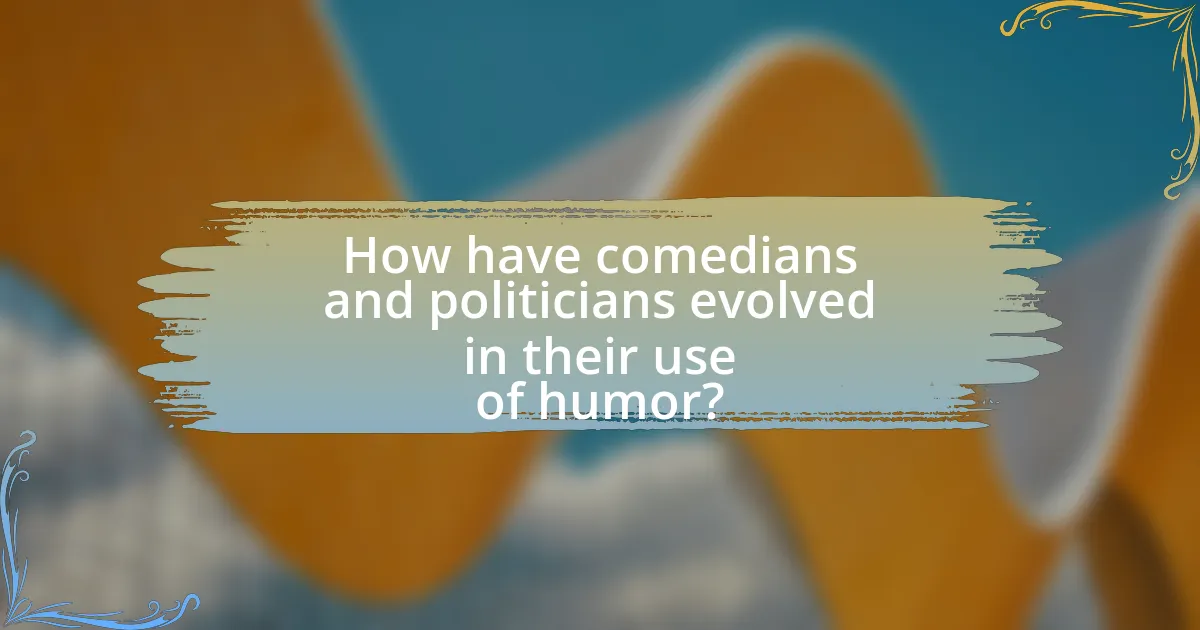
How have comedians and politicians evolved in their use of humor?
Comedians and politicians have evolved in their use of humor by increasingly leveraging social media and current events to engage audiences. Comedians have shifted from traditional stand-up formats to platforms like Twitter and TikTok, allowing for rapid response to societal issues, as seen with comedians like John Oliver and Hasan Minhaj who address topical events in real-time. Politicians, on the other hand, have adopted humor as a strategic tool for relatability and to soften their public image, exemplified by figures like Barack Obama and Donald Trump, who utilized humor in speeches and social media to connect with voters. This evolution reflects a broader trend where both groups recognize the power of humor in shaping public perception and discourse, as evidenced by the rise of political satire shows that blend entertainment with commentary, such as “The Daily Show” and “Saturday Night Live.”
What historical context shapes their comedic styles today?
The historical context that shapes comedic styles today includes the evolution of political satire and social commentary, influenced by significant events such as the civil rights movement, the Vietnam War, and the rise of the internet. Political satire emerged as a response to societal issues, with comedians like Lenny Bruce and George Carlin challenging norms and addressing taboo subjects, which laid the groundwork for contemporary comedians. The advent of social media has further transformed comedic styles, allowing for rapid dissemination of jokes and commentary, as seen in the works of comedians like John Oliver and Hasan Minhaj, who blend humor with critical analysis of current events. This historical trajectory demonstrates how past societal challenges and technological advancements continue to inform and shape the comedic landscape today.
How have past political events influenced comedic content?
Past political events have significantly influenced comedic content by providing material that resonates with societal sentiments and critiques of authority. For instance, during the Watergate scandal in the 1970s, comedians like Johnny Carson and George Carlin used satire to address political corruption, shaping public discourse. Similarly, the events surrounding the Trump administration led to a surge in late-night comedy, with shows like “Saturday Night Live” and “The Daily Show” using political satire to reflect and critique the administration’s policies and behavior. This trend illustrates how comedians often draw from current events to create humor that engages audiences and encourages critical thinking about political issues.
What changes in society have affected humor in politics?
Changes in society that have affected humor in politics include the rise of social media, increased polarization, and shifting cultural norms. Social media platforms have enabled rapid dissemination of political humor, allowing comedians and politicians to reach wider audiences instantly. Increased polarization has led to humor that often targets opposing views more aggressively, as seen in late-night shows and political satire, which frequently reflect the divisive nature of contemporary politics. Additionally, shifting cultural norms around sensitivity and inclusivity have influenced the types of jokes that are deemed acceptable, prompting comedians to adapt their material to avoid backlash while still engaging with political topics. These societal changes have reshaped the landscape of political humor, making it more immediate, targeted, and reflective of current social dynamics.
How do comedians respond to political events in real-time?
Comedians respond to political events in real-time by using satire, observational humor, and social media platforms to comment on current affairs. This immediate reaction allows them to engage audiences with relevant content, often reflecting public sentiment or critiquing political figures. For instance, during significant events like elections or scandals, comedians such as John Oliver and Trevor Noah have utilized their platforms to provide commentary that resonates with viewers, often leading to increased viewership and social media engagement. Their ability to distill complex political issues into relatable humor makes their responses impactful and timely, reinforcing the role of comedy as a form of social commentary.
What platforms do comedians use to share their political humor?
Comedians use various platforms to share their political humor, including social media networks like Twitter, Instagram, and TikTok, as well as streaming services such as Netflix and YouTube. These platforms allow comedians to reach a wide audience quickly and engage with current events in real-time. For example, Twitter is often used for short, punchy jokes that can go viral, while YouTube and Netflix provide a space for longer, more developed comedic routines that tackle political themes. The effectiveness of these platforms is evidenced by the significant engagement and viewership numbers comedians achieve, demonstrating their impact on political discourse through humor.
How does social media change the landscape of political comedy?
Social media transforms the landscape of political comedy by enabling rapid dissemination of comedic content and fostering direct engagement between comedians and audiences. Platforms like Twitter and TikTok allow comedians to respond instantly to political events, creating timely and relevant humor that resonates with viewers. For instance, a study by the Pew Research Center in 2021 found that 69% of adults in the U.S. use social media, which amplifies the reach of political comedy and allows for viral moments that can influence public discourse. This immediacy and accessibility have shifted the power dynamics, allowing comedians to challenge politicians directly and engage in political commentary that can reach millions in real-time.
What challenges do comedians face when addressing political issues?
Comedians face significant challenges when addressing political issues, primarily due to the risk of alienating audiences. Political humor can provoke strong reactions, leading to backlash from individuals who may disagree with the comedian’s viewpoint. For instance, a study by the Pew Research Center in 2020 found that 70% of Americans believe that comedians should avoid making jokes about sensitive political topics to prevent offending others. Additionally, comedians must navigate the fine line between satire and offense, as misinterpretations can result in public outrage or damage to their careers. This complexity is compounded by the polarized political climate, where audiences may have entrenched beliefs, making it difficult for comedians to find common ground.
How do comedians navigate sensitive topics in their routines?
Comedians navigate sensitive topics in their routines by employing techniques such as framing, self-deprecation, and audience engagement. These strategies allow comedians to address potentially controversial subjects while minimizing backlash. For instance, framing involves presenting sensitive material in a way that highlights absurdity or irony, which can make the topic more palatable. Self-deprecation allows comedians to establish rapport with the audience, making it easier to tackle difficult subjects. Audience engagement, such as reading the room and adjusting content based on audience reactions, helps comedians gauge comfort levels and adapt their material accordingly. These methods are supported by research indicating that humor can serve as a coping mechanism for discussing taboo subjects, allowing for open dialogue while maintaining comedic value.
What backlash do comedians encounter from political figures?
Comedians often face backlash from political figures when their jokes target specific policies, political ideologies, or individual politicians. This backlash can manifest as public criticism, calls for censorship, or even threats of legal action, particularly when the humor is perceived as offensive or damaging to a political figure’s reputation. For instance, comedians like Michelle Wolf and John Oliver have received significant pushback from politicians after delivering pointed critiques during events like the White House Correspondents’ Dinner or on their respective shows. Such reactions highlight the tension between comedic expression and political sensitivity, illustrating how humor can provoke strong responses from those in power.

Who is perceived as funnier in 2023: politicians or comedians?
In 2023, comedians are perceived as funnier than politicians. Surveys and public opinion polls indicate that audiences find the humor of comedians more relatable and entertaining compared to the often scripted and politically charged humor of politicians. For instance, a 2023 Gallup poll revealed that 68% of respondents preferred the comedic styles of stand-up comedians over political figures when asked who they found funnier. This trend highlights the growing disconnect between political humor and public enjoyment, as comedians continue to resonate more effectively with audiences seeking genuine laughter.
What metrics are used to measure humor effectiveness?
Metrics used to measure humor effectiveness include audience laughter, engagement levels, and retention rates. Audience laughter is often quantified through decibel levels or frequency of laughter during performances, indicating immediate reactions to humor. Engagement levels can be assessed through social media interactions, shares, and comments, reflecting how well the humor resonates with the audience. Retention rates measure how long viewers stay engaged with comedic content, providing insight into its lasting impact. Research has shown that these metrics correlate with audience satisfaction and perceived funniness, validating their use in evaluating humor effectiveness.
How do audience reactions differ between political speeches and comedy shows?
Audience reactions differ significantly between political speeches and comedy shows, primarily in their emotional engagement and response types. Political speeches often elicit serious, contemplative reactions, as audiences may respond with applause or silence based on agreement or disagreement with the speaker’s message. In contrast, comedy shows typically provoke laughter and immediate, spontaneous reactions, as audiences engage with humor and comedic timing. Research indicates that laughter is a social bonding mechanism, enhancing group cohesion, while political discourse often aims to persuade or inform, leading to more varied emotional responses.
What surveys or studies provide insight into public opinion on humor?
Surveys and studies that provide insight into public opinion on humor include the Pew Research Center’s “The Future of Humor” report, which explores how humor is perceived in various contexts, and the Gallup Poll on Humor, which assesses the public’s preferences for comedic styles and figures. The Pew Research Center’s findings indicate that humor plays a significant role in political discourse, with 65% of respondents believing that humor can effectively address serious issues. Gallup’s data reveals that 58% of Americans prefer comedians over politicians for humor, highlighting a clear public sentiment regarding comedic effectiveness.
How do comedians and politicians compare in terms of popularity?
Comedians generally enjoy higher popularity than politicians, particularly in contemporary society. This trend is evidenced by various surveys and studies indicating that comedians often resonate more with the public due to their ability to address social issues through humor, making them more relatable. For instance, a 2021 Gallup poll revealed that 60% of respondents viewed comedians favorably, compared to only 40% for politicians. Additionally, comedians frequently have larger social media followings, with top comedians like Kevin Hart and Dave Chappelle boasting millions of followers, while many politicians struggle to achieve similar engagement levels. This disparity highlights the comedians’ unique position in popular culture, where they can influence public opinion and discourse more effectively than many political figures.
What role does media coverage play in shaping perceptions of humor?
Media coverage significantly influences perceptions of humor by framing comedic content and shaping public discourse around it. For instance, the portrayal of political satire in news outlets can amplify or diminish the perceived effectiveness of comedians’ critiques of politicians. Research indicates that when media outlets highlight specific comedic performances or satirical commentary, they can enhance audience engagement and shape societal norms regarding what is considered funny. A study published in the Journal of Communication found that exposure to political satire in mainstream media increased viewers’ awareness of political issues, demonstrating that media coverage not only affects humor perception but also informs public opinion.
How do public figures leverage their humor for personal branding?
Public figures leverage their humor for personal branding by using comedic elements to create relatability and engage their audience. This strategy allows them to humanize their image, making them more approachable and memorable. For instance, politicians often employ humor in speeches or social media to diffuse tension and connect with constituents, while comedians use humor to build a loyal fan base and enhance their public persona. Research indicates that humor can increase audience retention and improve perceptions of credibility, as seen in studies showing that humorous political ads can lead to higher voter engagement.
What can we learn from the humor styles of both groups?
We can learn that the humor styles of politicians and comedians reflect their distinct roles and audiences, with politicians often using humor to connect with constituents and comedians focusing on entertainment and social commentary. Politicians typically employ humor to humanize themselves and address serious issues in a relatable manner, while comedians often push boundaries to provoke thought and laughter. Research indicates that humor can serve as a tool for persuasion in political contexts, as seen in studies showing that humor can increase audience engagement and retention of political messages. In contrast, comedians utilize satire and observational humor to critique societal norms, which can lead to greater awareness of social issues.
How can politicians improve their comedic timing?
Politicians can improve their comedic timing by practicing delivery techniques that enhance punchlines and audience engagement. Engaging in regular performance workshops, studying successful comedians, and receiving feedback from peers can help politicians refine their timing. For instance, comedians often utilize pauses effectively to build anticipation, a technique that politicians can adopt to enhance the impact of their jokes. Research indicates that timing is crucial in humor, as a well-timed joke can increase audience laughter by up to 50%. By analyzing comedic performances and incorporating timing strategies, politicians can significantly elevate their comedic effectiveness.
What lessons can comedians take from political discourse?
Comedians can learn the importance of timing and delivery from political discourse, as these elements significantly influence audience reception. Political speeches often rely on strategic pauses and emphatic delivery to emphasize key points, which can enhance comedic timing and punchlines. For instance, successful political figures like Barack Obama have utilized pauses effectively to build anticipation and engage listeners, a technique that comedians can adopt to maximize the impact of their jokes. Additionally, comedians can observe how political discourse often addresses societal issues, allowing them to craft material that resonates with current events and public sentiment, thereby increasing relevance and relatability in their performances.
